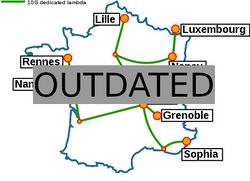Grid5000:Home
|
Grid'5000 is a large-scale and versatile testbed for experiment-driven research in all areas of computer science, with a focus on parallel and distributed computing including Cloud, HPC and Big Data. Key features:
|
Five random publications that benefited from Grid'5000 (at least 2937 overall):
- Lucian Trestioreanu, Flaviene Scheidt, Wazen M. Shbair, Jerome Francois, Damien Magoni, et al.. To Squelch or not to Squelch: Enabling Improved Message Dissemination on the XRP Ledger. 37th IEEE/IFIP Network Operations and Management Symposium (NOMS 2024), May 2024, Séoul, South Korea. hal-04621124 view on HAL pdf
- Alan Lira Nunes, Cristina Boeres, Lúcia Maria de A. Drummond, Laércio Lima Pilla. Optimal Time and Energy-Aware Client Selection Algorithms for Federated Learning on Heterogeneous Resources. 2024 IEEE 36th International Symposium on Computer Architecture and High Performance Computing (SBAC-PAD), Nov 2024, Hilo, France. pp.148-158, 10.1109/SBAC-PAD63648.2024.00021. hal-04690494v2 view on HAL pdf
- Matthieu Simonin, Anne-Cécile Orgerie. Méthodologies de calculs de l'empreinte carbone sur une plateforme de calcul - L'exemple du site de Rennes de Grid'5000. JRES 2024 – Journée Réseaux de l'Enseignement Supérieur, Dec 2024, Rennes, France. pp.1-13. hal-04762718v2 view on HAL pdf
- Maël Madon. Digital Sufficiency in Data Centers : Studying the Impact of User Behaviors. Computer Science cs. Université de Toulouse, 2024. English. NNT : 2024TLSES046. tel-04675558 view on HAL pdf
- Pierre-Etienne Polet. Portage des chaînes de traitement sonar sur architecture hétérogène : conception et évaluation d'un environnement de programmation basé sur les tâches moldables. Informatique cs. Ecole normale supérieure de lyon - ENS LYON, 2024. Français. NNT : 2024ENSL0004. tel-04633261 view on HAL pdf
Latest news
Failed to load RSS feed from https://www.grid5000.fr/mediawiki/index.php?title=News&action=feed&feed=atom: Error parsing XML for RSS
Grid'5000 sites
Current funding
As from June 2008, Inria is the main contributor to Grid'5000 funding.
INRIA |
CNRS |
UniversitiesUniversité Grenoble Alpes, Grenoble INP |
Regional councilsAquitaine |


